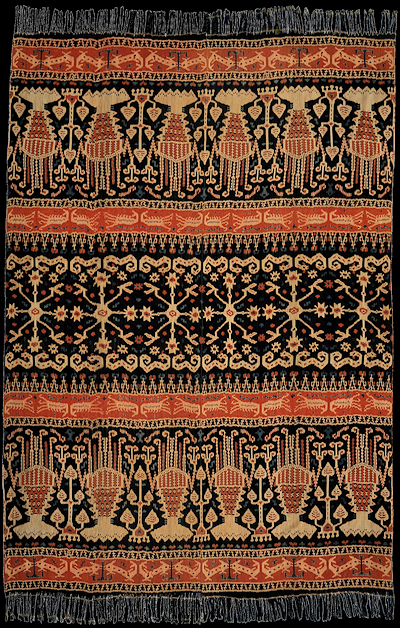| |

 | | | |
375 Sumba, East Sumba
Hinggi (men's blanket) 
| | Locale: | Kambera | | Period: | 1940s | | Yarn: | Cotton, hand-spun, extremely fine | | Technique: | Warp ikat | | Panels: | 2 | | Size: | 160 x 240 cm (5' 2" x 7' 10") LW: 1.50 | | Weight: | 835 g (29.5 oz), 217 g/m2 (0.71 oz/ft2) | | Design: | Asymmetric panels: the two shrimp closest to the extremities are far wider than the two closest to the seam. The same goes for the quadrilateral motifs in the centrefield - which are ikated separately but in terms of width perfectly match the width discrepancies in the endfields. The chief motifs are mantis shrimp,. formidable animals that can grow to 50 cm and are strong enough to crack crabs and shells. The centrefield is decorated with radiant core motifs. Between the centrefield and the endfields run horizontal bands decorated with smaller shrimp. Above the row with shrimp runs a strip of triangular shapes crowned with alternating red and blue dots which is called renda. The animals in the horizontal bands closest to the extremities could not be identified. The absence of kabakil, cross-woven borders, indicates that the cloth was never worn. Given Its extremely light weight it is likely that it was never intended to be worn, but to be kept in the adat house for its protection, with use as a shroud its ultimate telos. | | Comment: | The very generous proportions, which are quite rare, the ultra-light weight, the fine detailing and the highly sophisticated hidden devices (see Noble Virtuosity: HIdden Asummetry in Ikat from Sumba (to be published in 2024) are indicative of manufacture at the highest level of Kambera's community, probably by the queen or one of her daughters. | | Background: | Chapters on Sumba and East Sumba. | | Sources: | Similar to 19th to early 20th c. hinggi in Metropolitan Museum of Art, acc.nr. 1970.227.2, but larger and more detailed. Midfield similar to that on another hinggi in the same museum, early 20th c., acc. nr. 2016.736.5, but asymmetric and more refined. | | |

©Peter ten Hoopen, 2025
All rights reserved.
|
|


